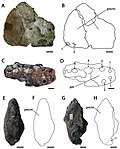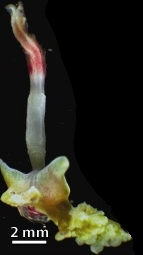The Cambridge Greensand is a geological unit in England whose strata are earliest Cenomanian in age. It lies above the erosive contact between the Gault...
14 KB (711 words) - 16:29, 5 November 2024
Folkestone, Kent, England, where it overlays the Lower Greensand formation, and underlies the Upper Greensand Formation. These represent different facies, with...
7 KB (596 words) - 17:34, 6 November 2024
expanded. The underlying geology of Cambridge consists of gault clay and Chalk Marl, known locally as Cambridge Greensand, partly overlaid by terrace gravel...
171 KB (14,383 words) - 00:23, 10 November 2024
of postcranial remains resembling those of Azhdarchoids from the Cambridge Greensand have been referred to Lonchodectes; however, much of this material...
13 KB (1,196 words) - 14:59, 13 September 2024
Fossil remains of Ornithocheirus have been recovered mainly from the Cambridge Greensand of England, dating to the beginning of the Albian stage of the early...
27 KB (2,763 words) - 19:02, 9 August 2024
Ornithocheirus, with a review of the specimens from the Cambridge Greensand in the Sedgwick Museum, Cambridge". Annals and Magazine of Natural History. 13 (78):...
23 KB (2,177 words) - 00:50, 18 June 2024
It contains two species, the type species, N. capito, from the Cambridge Greensand of England, and N. fluviferox from the Kem Kem Group of Morocco....
9 KB (773 words) - 09:12, 12 April 2024
Ornithocheirus, with a review of the specimens from the Cambridge Greensand in the Sedgwick Museum, Cambridge". Annals and Magazine of Natural History. 13 (78):...
81 KB (7,687 words) - 11:18, 7 November 2024
Eucercosaurus tanyspondylus and Syngonosaurus macrocercus from the Cambridge Greensand, UK". Cretaceous Research. 118: 104638. doi:10.1016/j.cretres.2020...
92 KB (3,836 words) - 09:42, 5 November 2024
the Early Cretaceous. It was an iguanodontian discovered in the Cambridge Greensand of England and was first described in 1879. The type species, S....
5 KB (385 words) - 22:53, 6 July 2024
Cretaceous Province' of Northern Ireland the clastic-dominated Hibernian Greensands Group and the overlying Ulster White Limestone Group are the stratigraphical...
22 KB (2,434 words) - 15:01, 7 November 2024
a genus of anhanguerid pterosaur from the Albian–Cenomanian-age Cambridge Greensand of England. It contains only one species, Aerodraco sedgwickii. It...
6 KB (550 words) - 08:48, 12 April 2024
Lower Cretaceous Jiufotang Formation of northeastern China, and the Cambridge Greensand of England. It is notable for its unusual skull, which features a...
13 KB (1,158 words) - 01:28, 15 June 2024
paleontologist David Unwin revised the taxonomic history of the Cambridge Greensand pterosaurs, and divided Ornithocheiridae into three genera: Ornithocheirus...
53 KB (5,548 words) - 12:41, 14 October 2024
procoelous vertebrae from the Cambridge Upper Greensand, preserved in the Woodwardian Museum of the University of Cambridge", Quarterly Journal of the Geological...
10 KB (1,082 words) - 22:50, 6 July 2024
characteristic of Osedax are from a plesiosaur humerus from the Cambridge Greensand, England, likely reworked from late Albian (c. 100 million years...
36 KB (4,226 words) - 03:54, 11 November 2024
herbivorous nodosaurid dinosaur, from the late Albian-age Lower Cretaceous Cambridge Greensand of Cambridgeshire, England. It has in the past been classified with...
8 KB (934 words) - 04:25, 23 July 2024
non-pterodactyloid pterosaur known. Later in the century, the Early Cretaceous Cambridge Greensand produced thousands of pterosaur fossils, that however, were of poor...
144 KB (16,501 words) - 17:13, 24 October 2024
existence of a partial set of toothless pterosaur jaws from the Cambridge Greensand of England, which he named Ornithostoma. Because the primary characteristic...
71 KB (7,888 words) - 11:14, 8 November 2024
nasutus. The holotype, CAMSM B 54556, had been found in a layer of the Cambridge Greensand dating from the Cenomanian but probably containing reworked fossils...
14 KB (1,282 words) - 09:15, 12 April 2024
2001. In 2001, Unwin also reassigned the two other species from the Cambridge Greensand to Coloborhynchus: C. capito and C. sedgwickii, the second of which...
25 KB (2,538 words) - 03:09, 7 April 2024
by Harry Govier Seeley in 1869 in his index of fossils from the Cambridge Greensand. In 1876 Seeley more thoroughly described the type species, Macrurosaurus...
8 KB (905 words) - 02:06, 9 October 2024
incomplete rostrum of Coloborhynchus capito (Seeley 1870) from the Cambridge Greensand of England". Cretaceous Research. 34: 1–9. doi:10.1016/j.cretres...
31 KB (1,227 words) - 12:15, 14 October 2024
known from the eastern United Kingdom. It was collected from the Cambridge Greensand Formation, dating to late Albian or early Cenomanian stage, of the...
2 KB (141 words) - 15:45, 24 August 2021
S2CID 129524747. Seeley, H.G. (1879). "On the Dinosauria of the Cambridge Greensand". Quarterly Journal of the Geological Society. 35 (1–4): 591–636...
36 KB (2,634 words) - 19:27, 4 June 2024
R.496, a dentary tooth from the late Albian-age Lower Cretaceous Cambridge Greensand, Cambridgeshire, England, regarded as a dubious early hadrosaurid)...
10 KB (1,177 words) - 01:06, 14 August 2024
Ornithocheirus, with a review of the specimens from the Cambridge Greensand in the Sedgwick Museum, Cambridge". Annals and Magazine of Natural History. 13 (78): 529–557...
62 KB (6,552 words) - 13:37, 27 September 2024
Museum at Cambridge, referred three snout fragments of toothless pterosaur specimens from the Lower Cretaceous Albian Cambridge Greensand of England...
9 KB (1,012 words) - 12:11, 24 April 2024
Cambridge Greensand, England, Albian-Cenomanian, France, Spain, Cenomanian Trachydermochelys phlyctaenus Seeley 1869 (revised Joyce, 2022), Cambridge...
9 KB (813 words) - 12:38, 14 October 2024
machae[r]orhynchus. Its holotype, CAMSM B54855, was near Cambridge found in a layer of the Cambridge Greensand dating from the Cenomanian but containing reworked...
15 KB (1,452 words) - 14:59, 13 September 2024

























